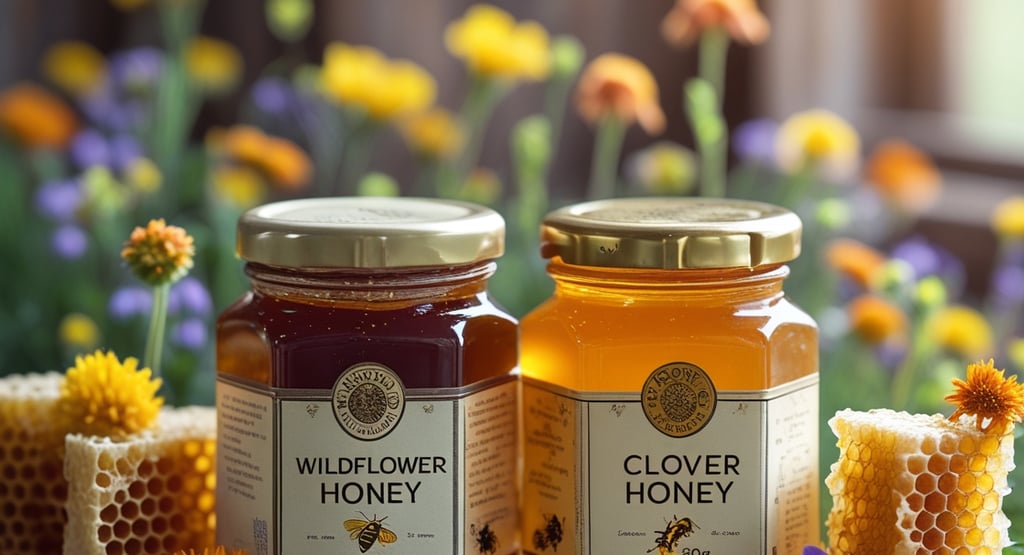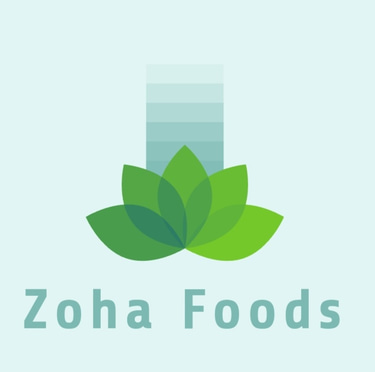Wildflower Honey vs Clover Honey – Which Is Healthier? (2025 Guide)
Meta Description: Discover the differences between wildflower honey vs clover honey in this 2025 guide. Compare taste, nutrition, health benefits, and uses to find out which is healthier for you.
HONEY
Zia Khan
9/7/20254 min read


Honey has been treasured for thousands of years as both a natural sweetener and a healing remedy. But when you step into a supermarket or health store today, you’ll notice dozens of varieties: organic honey, raw honey, manuka honey, clover honey, wildflower honey, and more. Among these, wildflower honey and clover honey are two of the most popular.
Consumers often wonder: Which is healthier? Which has more benefits?
In this 2025 guide, we’ll explore everything you need to know about wildflower vs. clover honey — from their origins and taste to nutritional values, health benefits, culinary uses, and potential drawbacks. By the end, you’ll be able to choose the honey that best matches your diet, health goals, and lifestyle.
What Is Clover Honey?
Clover honey is one of the most common and widely consumed types of honey worldwide. It comes from bees that primarily forage on clover blossoms. Since clover plants grow abundantly in many regions (especially North America and Europe), clover honey is produced in large quantities, making it affordable and easy to find.
Key features of clover honey:
Color: Pale golden or light amber.
Taste: Mild, floral, sweet, and smooth.
Texture: Typically liquid, sometimes crystallized.
Availability: Found in nearly every grocery store.
Because of its neutral taste and versatility, clover honey is often used as the standard table honey for sweetening tea, drizzling on toast, or baking.
What Is Wildflower Honey?
Wildflower honey, as the name suggests, is made from the nectar of various wildflowers that bloom in a specific season or region. The exact flavor and nutritional profile of wildflower honey depends on which flowers the bees visit, meaning every batch is unique.
Key features of wildflower honey:
Color: Ranges from light amber to dark brown, depending on floral sources.
Taste: Rich, complex, often stronger than clover honey.
Texture: Can vary from thin to thicker, depending on processing.
Availability: Readily available in health stores, farmers’ markets, and online.
Because it reflects the biodiversity of an area, wildflower honey is often favored by those looking for a more natural and artisanal product.
Nutritional Comparison – Wildflower Honey vs. Clover Honey
Both types of honey contain similar amounts of natural sugars, vitamins, and antioxidants, but their nutritional composition varies slightly depending on the floral sources.
Here’s a comparison per tablespoon (21 grams):
Key takeaway:
Clover honey is simple, light, and predictable.
Wildflower honey is more complex, often richer in antioxidants and phytochemicals.
Health Benefits of Clover Honey
Clover honey isn’t just sweet — it offers numerous health perks:
Supports Wound Healing – Like all raw honeys, clover honey has antibacterial properties that may aid wound healing when applied topically.
Boosts Energy – Its natural sugars provide a quick energy boost, ideal before workouts.
Soothes Coughs & Sore Throats – A spoonful of clover honey is a time-tested remedy for soothing irritation.
Heart-Friendly Sweetener – When used in moderation, honey may be a healthier alternative to refined sugar.
Mild on the Stomach – Its gentle flavor and lighter composition make it ideal for people with sensitive digestion.
Health Benefits of Wildflower Honey
Wildflower honey offers all the general benefits of clover honey — but with some unique advantages:
Rich in Antioxidants – Thanks to the diverse nectar sources, wildflower honey often has a higher antioxidant content, helping combat oxidative stress.
Immune Support – Some studies suggest that consuming local wildflower honey may help with seasonal allergies.
Anti-Inflammatory Properties – Wildflower honey is often darker, and darker honeys usually contain more anti-inflammatory compounds.
Unique Flavor for Natural Medicine – Its strong taste makes it popular in herbal remedies and teas.
Microbial Defense – Similar to manuka honey (though less potent), some wildflower honeys show strong antimicrobial activity.
Taste Test – Which Honey Is Better?
Taste is subjective, but here’s how they compare:
Clover honey – Mild, smooth, universally liked, perfect for kids and those who don’t enjoy strong flavors.
Wildflower honey – Rich, bold, sometimes earthy, with layers of taste that vary from batch to batch.
If you like predictability and mild sweetness, go for clover honey.
If you enjoy complex, artisanal flavors, wildflower honey is the winner.
Culinary Uses of Clover vs. Wildflower Honey
Clover Honey Uses:
Tea, coffee, smoothies
Baking (cakes, cookies, bread)
Breakfast toppings (pancakes, waffles, toast)
Salad dressings and marinades
Wildflower Honey Uses:
Strong cheeses (goat cheese, blue cheese)
Herbal teas and medicinal tonics
Glazes for roasted meats
Gourmet desserts and specialty cocktails
Which Is Healthier – Wildflower or Clover Honey?
If your focus is nutrition and antioxidants, wildflower honey usually wins due to its diversity of nectar sources.
If your focus is affordability, mild taste, and availability, clover honey is a reliable choice.
👉 Pro Tip: For maximum benefits, choose raw, organic honey — whether clover or wildflower. Processing and pasteurization strip away many natural enzymes and antioxidants.
Possible Side Effects & Considerations
High in Sugar: Both honeys should be consumed in moderation, especially for diabetics.
Infants Warning: Never give honey (of any type) to children under 1 year due to botulism risk.
Allergies: Rare, but possible in people allergic to specific pollens.
Quality Issues: Commercial honeys are sometimes diluted with syrups. Always buy from trusted sources.
Sustainability & Beekeeping Impact
Clover farming often involves large-scale agriculture, which may affect bee populations through pesticide exposure. Wildflower honey usually comes from smaller-scale, biodiverse environments, which may be better for pollinator health.
Choosing local, organic honey supports sustainable beekeeping and helps preserve ecosystems.
Wildflower Honey vs Clover Honey – Final Verdict
For daily sweetening & affordability → Clover honey.
For health-conscious consumers & flavor seekers → Wildflower honey.
For best of both worlds → Keep both in your pantry and use them according to recipes and health needs.
Related Reading
These related guides explore deeper into honey’s healing powers, history, and quality factors.
FAQs – Wildflower vs. Clover Honey
1. Is wildflower honey healthier than clover honey?
Generally yes — it has more antioxidants due to diverse nectar sources.
2. Which honey tastes better?
Clover honey is mild; wildflower is richer and more complex.
3. Can wildflower honey help with allergies?
Some people report relief from seasonal allergies when consuming local wildflower honey.
4. Is clover honey good for children?
Yes, but never for children under 1 year old.
5. Which honey is better for cooking?
Clover honey for baking; wildflower honey for gourmet dishes and herbal remedies.
